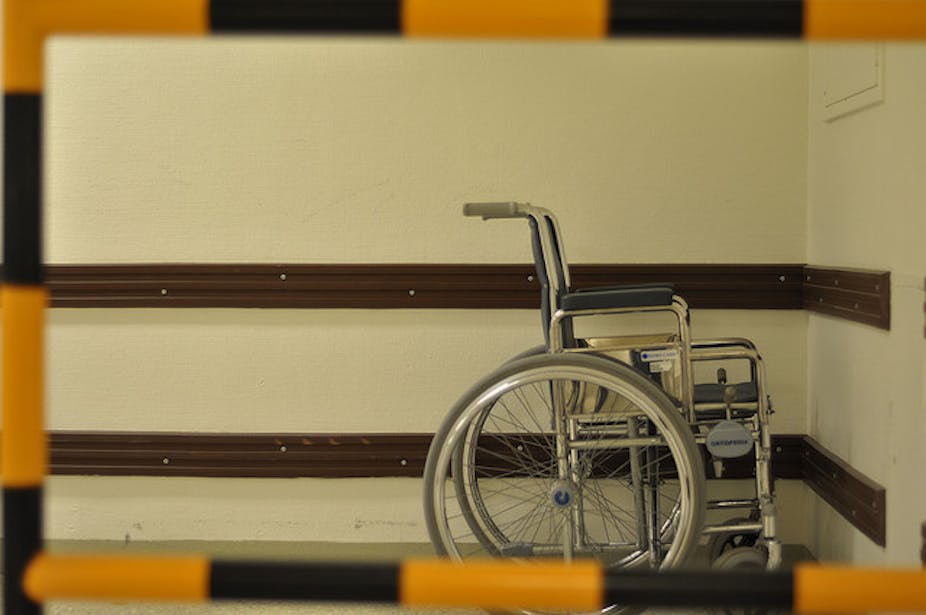Research published this week confirms what disability advocates have long known: that young people shouldn’t be forced to live in nursing homes. Our joint Summer Foundation and Monash University study found that moving out of nursing homes enriched the lives of people with disability: they went outside more often, had more opportunities to make everyday choices, had more social contact and spent less time in bed.
But these results must be considered in the context of these young people’s lives. Many were living extremely impoverished existences, and the improvement in the quality of life came from a very low baseline. Aged care nursing homes are resourced and designed to cater for people at the end-stage of their life – not young people who need support to reach their full potential and the opportunity to maximise their independence.
The five-year national Younger People in Residential Aged Care (YPIRAC) initiative that ended in June 2011 made a tremendous difference to the lives of participants, with some 244 people aged under 50 avoiding nursing home placement. Another 250 young people moved out of nursing homes into largely domestic-scale group homes.
But with the end of the initiative, the system has, for the most part, reverted to the way things were in the past. More than 200 people aged under 50 continue to be at risk of nursing home placement each year in Australia.
The most striking change identified in our study for those who’d moved out of nursing homes was the increased opportunity to make everyday choices. This included choosing what to eat and when to go to bed. One participant, Caroline, said: “At first I probably missed being told what to do or when to do it because it was so structured…I think I got a little bit lost at first, but I think that would be normal for anybody. But now I don’t…it’s good. I don’t have to have tea at 5 o’clock anymore. I can have it at 6.30pm if I want.”

The lack of access to adequate equipment in nursing homes also means some young people are denied their basic human rights. Without funding for appropriate wheelchairs with supported seating, freedom of movement is severely restricted, and secondary health conditions are exacerbated. Appropriate seating ensures these young people can swallow safely, sit out of bed without experiencing pain and get outside and into the community.
It’s also not uncommon for nursing homes to have locked doors, further denying access to the outside world. Another participant, Nicole, aged 33, explained: “When I was told I had the opportunity to move out of a nursing home I couldn’t wait…I wanted to get out. I couldn’t, I was locked in…The doors were locked.”
Freedom of expression is also limited in the nursing home environment. Prior to the YPIRAC program, there was little or no access to speech pathology services and equipment that would permit the communication of basic needs. Wal, a young man who spent two years without being able to communicate, said after receiving a communication device through the program, “It’s like going to bed a mute and waking up being able to communicate again. My life has begun again…”
The United Nations Convention on the Rights of Persons with Disabilities (CRPD) states that all people with a disability should have the “opportunity to choose their residence and where and with whom they live on an equal basis with others, and not be obliged to live in particular living arrangements”.
The Australian Government ratified this convention in July 2008. But some four years later, the disability service systems in Australia is still not sufficiently resourced to fulfil the obligations agreed to in the United Nations CRDP, especially for people who require access to 24-hour support.
The issue of young people in nursing homes is one clear reason Australia needs a National Disability Insurance Scheme (NDIS), which is expected to provide the funding for disability supports young people require to live in the community. But the NDIS cannot, on its own, stop the inappropriate placement of young people in nursing homes. We need services that prevent new admissions to aged care, create pathways back to community living and offer age-appropriate supported accommodation options for this group of marginalised people.
As Disability Discrimination Commissioner Graeme Innes recently said, “nursing homes have an important function in our society, but they are no place for young people with disability.” While we wait for the implementation of the NDIS, we need to design and develop accommodation and service options that are consistent with basic human rights principles and develop services that bring young people in nursing homes back into the mainstream of society.

